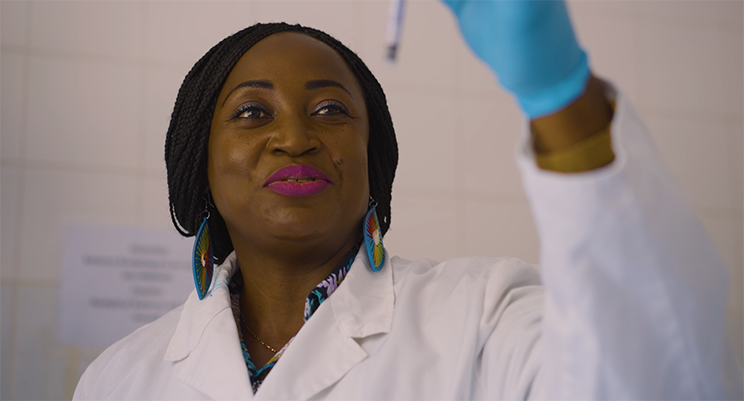Madeleine Eunice’s story: inspiring women in health research

In the field of health research, women have often faced significant challenges in their pursuit of scientific careers. Dr Madeleine Eunice Betouke Ongwe from Gabon, a recent PhD graduate in immunometabolism from the Leiden University in the Netherlands, shares her inspiring journey and the crucial role of the WISE Fellowship programme in her career development.
A unique path to health research
Madeleine Eunice’s journey into health research was not a conventional one. “Nothing initially predestined me to pursue a career in health research, as my academic background is in ecology and plant biology. I was actively looking for a fully funded PhD in my original field of study, but despite several applications, none were successful,” she reflects. However, her strong laboratory skills and experience in molecular biology led her to a clinical research centre, marking her transition into this new field.
As she advanced in her career, she became the co-supervisor of the immunology and molecular biology laboratory. Her participation in a flow cytometry training at the Department of Parasitology at Leiden University Medical Center opened new opportunities for her PhD studies. “That training opened the door for me to pursue a PhD in immunometabolism within the same department,” she explains.
Building foundations and overcoming challenges
Although Madeleine Eunice began her PhD without a strong academic background in immunology, her determination and practical experience drove her forward. “I was highly motivated, dynamic, autonomous, and had substantial experience in laboratory techniques,” she explains, highlighting how these qualities helped her establish a strong foundation for her research career.
Having recently earned her PhD in immunometabolism, she returned to her home country to apply her expertise and to contribute to the advancement of local research capacity. “I am currently engaged in a postdoctoral position within a research group, where I coordinate both scientific and clinical research activities,” she shared.
She notes that her research career has evolved significantly since she began her PhD. “My PhD research focused, among other things, on the use of non-invasive samples such as urine to detect biomarkers of infections like malaria. Today, I serve as the principal field investigator coordinating the collection of another non-invasive sample—saliva—for a study aimed at designing a rapid test to detect a Plasmodium falciparum enzyme in the saliva of malaria-infected participants. In parallel with this work, I also teach immunometabolism—a field still relatively unknown in the sub-region—to master’s students in immunology,” she elaborates, highlighting the innovative nature of her work.
The impact of the WISE Fellowship programme
In 2020, EDCTP2 launched a dedicated PhD fellowship scheme aimed at supporting women in health research across sub-Saharan Africa. Coordinated by the EDCTP Networks of Excellence, this initiative received funding from the UK National Institute for Health and Care Research (Department of Health and Social Care). Madeleine Eunice was among the 32 researchers who benefited from this initiative.
The WISE programme has played a vital role in her professional development. “The WISE programme is highly attractive because it is specifically dedicated to women from sub-Saharan Africa. This creates a valuable opportunity for selection based on criteria that reflect our unique regional and gender-specific contexts,” she said. The funding she received during her PhD studies enabled her to complete her thesis and publish her research articles*, despite challenges posed by the COVID-19 pandemic.
Addressing challenges in science
Madeleine Eunice recognises the significant challenges women face in science, particularly regarding the balance between family and career. She points out, “One of the major challenges women face in scientific research is balancing family life with the demands of a research career.” This struggle can discourage many talented women from pursuing long-term careers in research.
To create a more inclusive environment, Madeleine Eunice advocates for increasing the visibility of women in science, adapting recruitment criteria, and implementing mentorship programmes. “With determination and commitment, it is possible to create an environment that truly integrates the needs of women and supports their growth and fulfilment in science,” she asserts. She elaborates on the importance of mentorship, stating, “Implementing awareness and mentorship programmes that inspire young girls to pursue science is vital for a more equitable future.”
Future aspirations
Looking ahead, her aspirations are clear. “I hope to continue pursuing a career in scientific research and to further develop my expertise in my field. Above all, I aspire to inspire women and young girls to engage in immunology and immunometabolism—areas of science that remain significantly underrepresented by women in Africa. My goal is to contribute not only through research, but also by helping to build a more inclusive and gender-balanced scientific community,” she states with conviction.
Her advice to aspiring women in health research is both empowering and encouraging: “Believe deeply in their potential—equal to, if not greater than, that of their male counterparts. They should remain determined and courageous in the face of challenges, because they are fully capable of overcoming them.”
In her quest to foster a more inclusive scientific community, Dr Madeleine Eunice Betouke Ongwe embodies resilience and passion, serving as a beacon of hope for future generations of women in science.
Discover the inspiring journey of Dr Madeleine Eunice Betouke Ongwe – watch now!
*Research articles:
- Betouke Ongwe ME, Mouwenda YD, Stam KA, et al. Investigation of urinary metabolomics in a phase I hookworm vaccine trial in Gabon. PLoS ONE. 2022;17(9): e0275013. doi.org/10.1371/journal.pone.0275013
- Betouke Ongwe ME, Kohler I, Manurung MD, et al. Urinary Metabolic Profiling in Volunteers Undergoing Malaria Challenge in Gabon. Metabolites. 2022;12(12):1224. doi:10.3390/metabo12121224
- Betouke Ongwe ME, Mouwenda YD, Manurung MD, et al. Potentiation of the axis involving pentose phosphate pathway/NADPH oxidase/reactive oxygen species drives higher IL-10 production in monocytes of Sub-Saharan Africans. Eur. J. Immunol. 2024,54: 2451029. doi.org/10.1002/eji.202451029
